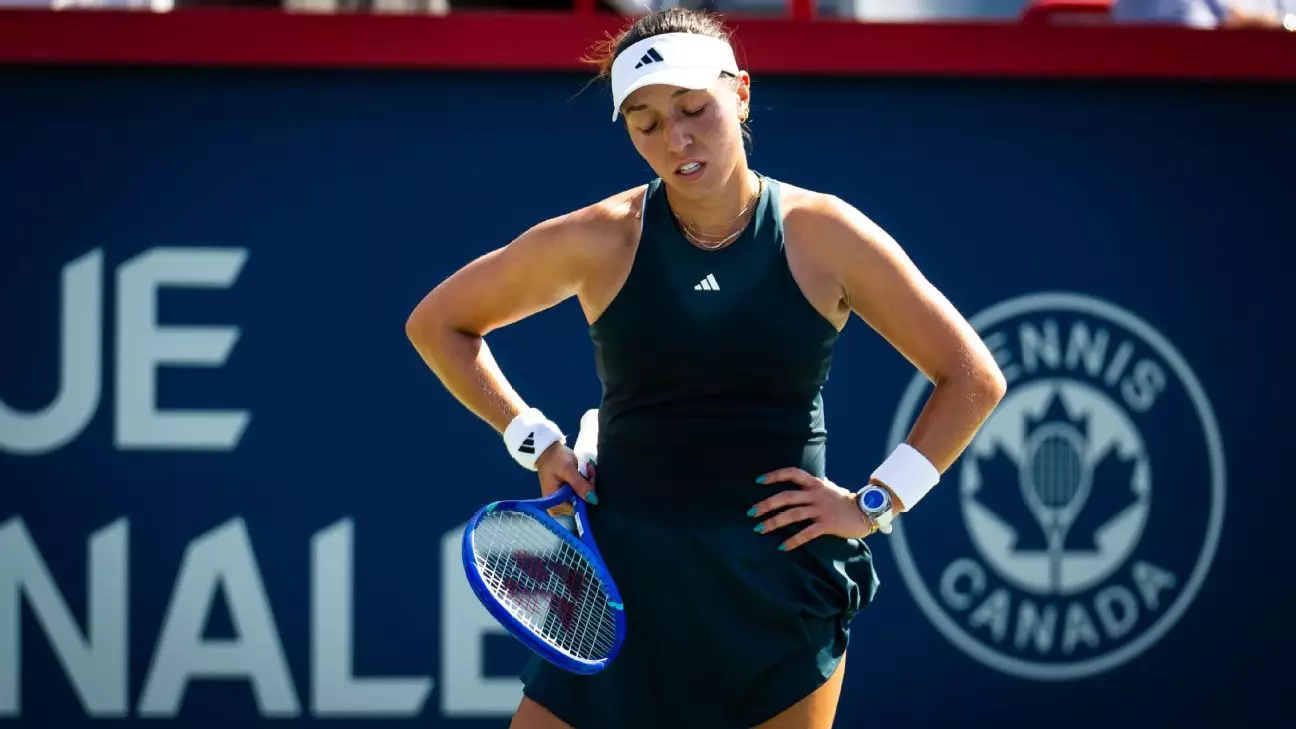In an unexpected turn of events, the tennis world witnessed the surprising exit of two-time defending champion Jessica Pegula from the prestigious National Bank Open in Montreal. Pegula, often heralded for her consistency and power, succumbed to seasoned Latvian Anastasija Sevastova in a three-set marathon. Despite her lofty seeding and recent form, Pegula couldn’t outlast Sevastova’s strategic play, losing 3-6, 6-4, 6-1. This defeat not only disrupts the draw but also raises compelling questions about the fragility of dominance in professional tennis. Pegula’s inconsistency this season—marked by early exits and fluctuating confidence—highlighted her vulnerabilities, which a savvy opponent exploited masterfully. Her frustration with her performance resonates deeply; it underscores how even the most formidable players can be brought down by mental lapses or a shift in momentum. The loss signals a wake-up call: success in tennis demands unwavering focus, but the sport also reminds us that glory is fleeting, and defeat often comes unannounced.
Resilience Personified: Sevastova’s Inspirational Return
Sevastova’s victory goes beyond an upset; it is a testament to perseverance in the face of adversity. Once ranked as high as 11th, her journey has been marred by injuries, including a devastating ACL tear and a long battle back from maternity leave that kept her court time limited. Coming into Montreal with a protected ranking—an acknowledgment of her tough road back—her victory over Pegula was a narrative of resilience. Her comeback was not merely about individual matches; it embodies a powerful message about fighting through setbacks that often seem insurmountable. Sevastova’s gameplay, particularly her tactical nous and mental toughness, allowed her to break Pegula multiple times and take control of the match. Her statement about wanting to stay on court ‘as long as possible’ exemplifies her fighting spirit. At 35 and with her ranking plummeting to 386, her win signals that experience, grit, and determination can challenge the odds, inspiring both fans and fellow players alike.
The Dynamics of Youth and Experience in Modern Tennis
The tournament also highlighted the clash between emerging talent and seasoned veterans. Iga Swiatek, embodying the future of tennis, delivered a commanding performance against Eva Lys. Her 6-2, 6-2 victory underscores her evolution into a player capable of dominating matches with composure and power. Facing Clara Tauson, Swiatek demonstrated her readiness to go deep into the tournament. Meanwhile, youthful hope was on display with Naomi Osaka’s confident win over Jelena Ostapenko. Osaka’s aggressive return game and mental toughness proved crucial in her 6-2, 6-4 victory, echoing her potential to reclaim top form after a period of inconsistency. The tournament exemplifies a sport where experience and youth often intersect, creating a competitive landscape that is both unpredictable and thrilling. It also suggests that the future can no longer be solely predicted by age; effort, resilience, and tactical maturity are equally vital.
The Reality Check for Top Seeds and the Road Ahead
For the top seeds like Pegula, the tournament has become a critical reflection of potential pitfalls. Her candid admission of feeling ‘up and down’ is a reminder that mental composure is as vital as physical skill. The women’s draw is proving to be wide open, with unexpected victories pointing to a more competitive era where traditional favorites are vulnerable. On the other hand, players like Anisimova and Keys are seizing opportunities, demonstrating that momentum and mental fortitude can elevate lesser-rated competitors into genuine title contenders. Svitolina’s resurgent form and Keys’ ability to recover after an initial setback underscore the importance of adaptability in a sport increasingly defined by rapid shifts and fierce competition. Moving forward, every player must adapt to the evolving dynamics where resilience and tactical flexibility often determine success over raw talent alone.
This tournament encapsulates the essence of modern tennis—an unpredictable, emotionally charged sport where narratives evolve rapidly. Achievements are fleeting, and survival depends on one’s ability to adapt, fight through adversity, and seize opportunities when they arise. The Montreal Masters serves as both a stage for rising stars and a humbling arena for seasoned champions, reinforcing that tennis remains both a test of physical prowess and mental resilience—a game of inches, patience, and relentless determination.

